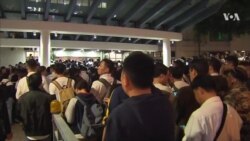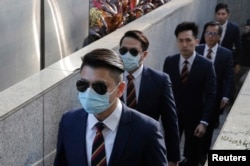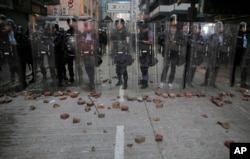More than 30,000 current and former police officers in Hong Kong took to the streets late Wednesday night, in a show of support for colleagues who were recently convicted of assaulting an activist during the 2014 Occupy protests.
The mass demonstrations were described as the largest gathering of police officers the city has seen in half a century.
While the police have every right to exercise their freedom of speech and assembly, many supporters’ acts and harsh comments toward the judge may have constituted contempt of court and posed a challenge to the city’s rule of law, analysts say.
Discontent
Joe Chan, chairman of the Junior Police Officers’ Association — one of the organizers, told the rally that his association and three other police staff groups would soon write to the city’s chief executive, urging legislation that bans insults against public officers on duty including the police, the South China Morning Post reported.
The police groups had previously vowed to raise funds to help file an appeal for the seven convicted police officers, each of who received a prison term of two years last Friday after being found guilty of beating pro-democracy activist Ken Tsang.
The convicted officers had denied any wrongdoing although their brutality was caught on tape and later aired on local TV news.
According to a participating officer, Wednesday’s rally was meant to be neither a protest against the courts or Hong Kong’s judicial system, nor an attempt to undermine the rule of law.
“It is a deep and heartfelt expression of genuine support for our colleagues and their families, who we feel have been unfairly treated and whose actions came out of a time of highly charged political emotion and stress,” the officer told the Post.
Contempt of court
Prior to Wednesday’s mass protests, small-scale street parades had been put on by the police’s supporters, some of whom got carried away and called Judge David Dufton “a bullying dog” — a provocation analysts believe had gone too far.
“All these [harsh comments] could be considered to be contempt of court and could be prosecuted. So all these things as if it would mean to the question of what would be the bottom line of maintaining the rule of law and also the freedom of expression and assembly here in Hong Kong,” said Patrick Poon, China Researcher at Amnesty International.
Other observers, however, regretted that rally participants have chosen the wrong side of the justice.
Dixon Sing, an associate professor of social science at the Hong Kong University of Science and Technology, said that he found the pro-police demonstrations hard to justify although he disagreed their protests will pose a challenge to the city’s deep-rooted judicial system.
“This act [protest] would not shake up the general public’s belief in the rule of law. Rather, it would unsettle and erode the public’s trust and respect for the policemen because what the seven have done is glaringly wrong,” the professor said.
Rally participants lack a fair assessment of the situation, he said, adding that the city’s top leader should have taken up a bigger political responsibility in having ordered the police to use tear gas and water cannon against supporters of the Umbrella movement.
Harsh reaction from Chinese nationalists
The police rally, however, has sparked an outpouring of nationalist comments from Chinese netizens.
On Sina Weibo, China’s Twitter-like microblogging platform, the majority of thousands of users pointed fingers at Dufton, the British judge.
“A foreigner judge has found Chinese cops guilty, but those pro-independent Occupy activists innocent. Is Hong Kong still a special administrative region under China? Why does Hong Kong continue to appoint foreigner judges,” a Weibo user complained.
Another angry user named Jimy-89 added, “Kick those British slaves out!”
Professor Sing, however, found these netizens’ negative comments unsurprising as there is a huge discrepancy between the level of tolerance for police brutality in Hong Kong and China.
In Hong Kong, policemen are expected to exercise professionalism and forbidden from abusing their power while their counterparts in China sever those in power in their pursuit for political stability, he said.
“[In China,] there has also been a lot of tradition of stressing the importance of political stability and the police forces are framed as a major pillar to bolster the stability,” Sing said.
Also, Beijing’s deliberate policy of framing pro-democracy activists in Hong Kong as unruly gangsters gave the general public in China the wrong impression, which reinforces their sympathy for law enforcers in Hong Kong.
Yet, a few netizens in China still threw support behind the judicial independence in Hong Kong.
A Weibo user called Chinese nationalists’ reaction “pathetic,” arguing that “those seven police officers shouldn’t have taken the law into their own hands.”











